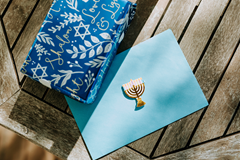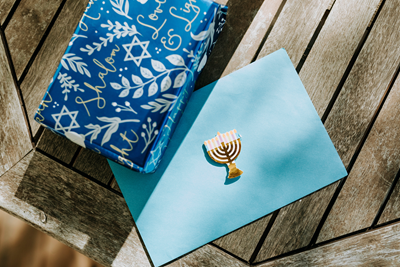Wed 13 Dec. 2023
The Insurance Institute of Manchester celebrates Hanukkah

Hanukkah takes place annually and this year falls from 7th to the 15th December, and we extend our warmest wishes to our Jewish colleagues and friends, recognising the rich cultural heritage and profound symbolism of this special holiday.
We asked Alex Cohen, Director, Bridge Insurance Brokers Ltd, to explain Hanukkah’s origins and how its diverse traditions reflect the adaptability and inclusiveness of Jewish cultural practices.
Hanukkah, also known as the Festival of Lights, holds a significant place in the Jewish calendar. Although not a High Holy Day with the same importance as Yom Kippur (Day of Atonement) or Rosh Hashanah (Jewish New Year), it is still celebrated by the Jewish community around the world, as a festival which emphasises the power of light over darkness.
Hanukkah, meaning "dedication" in Hebrew, is celebrated for eight days, typically in December, commemorating the rededication of the Second Temple in Jerusalem in the 2nd century BCE. This momentous event occurred following a fierce rebellion against the oppressive reign of the Seleucid Empire, which sought to suppress Jewish traditions and practices.
The story of Hanukkah revolves around a miraculous event that occurred during the Temple's rededication. When the Maccabean rebels recaptured the Temple, they found only enough pure, consecrated oil to light the menorah, the seven-branched candelabra, for one day. To their astonishment, the oil miraculously lasted for eight days, providing ample time to prepare more oil in accordance with Jewish law. This miraculous flame became a symbol of hope and perseverance, representing the triumph of good over evil and faith in the face of adversity.
As a result of this miracle, Hanukkah is celebrated by lighting candles each night of the festival on a special menorah, known as a Hanukiah, which has nine branches, one for each of the eight nights of Hanukkah and the ninth holder, called the shamash, which is used to light the other candles, each evening.
Alongside the menorah lighting, Hanukkah is marked by various traditions, including gift-giving and playing of dreidels, which are four-sided spinning tops. During the festival, it is customary to eat foods which are cooked using oil, such as latkes (potato pancakes) and doughnuts to commemorate the miracle.
While, the principles of faith, light and community celebration remain the same, different countries mark the festival in unique ways. The United States sees a blend of traditional and modern celebrations. Many Jewish families also engage in charitable acts during Hanukkah, known as 'tzedakah'. Public menorah lightings in places like New York City are grand events, often accompanied by live music and festive gatherings. In Israel, schools are closed, and families take the time to travel and visit relatives. Moroccan Jews have a unique Hanukkah tradition called 'Hilula de Rabbi El Batach' where they light candles and visit the graves of revered sages, offering prayers. They also celebrate with traditional Moroccan dishes, often incorporating olive oil, a nod to the Hanukkah miracle.
These diverse traditions reflect the adaptability and inclusiveness of Jewish cultural practices, allowing for the celebration of Hanukkah in ways that resonate with the local culture and customs of Jewish communities worldwide.
Hanukkah has even been celebrated in some rather surprising locations. In 1993 American astronaut, Jeff Hoffman took a Hanukiah and a dreidel into space on the shuttle Endeavour. His Hanukah celebrations were broadcast to the world by satellite.
As we celebrate Hanukkah, we extend our warmest wishes to our Jewish colleagues and friends, recognising the rich cultural heritage and profound symbolism of this special holiday. May the spirit of Hanukkah – the triumph of light over darkness, the resilience of the human spirit, and the joy of shared traditions – inspire us all throughout the year.

